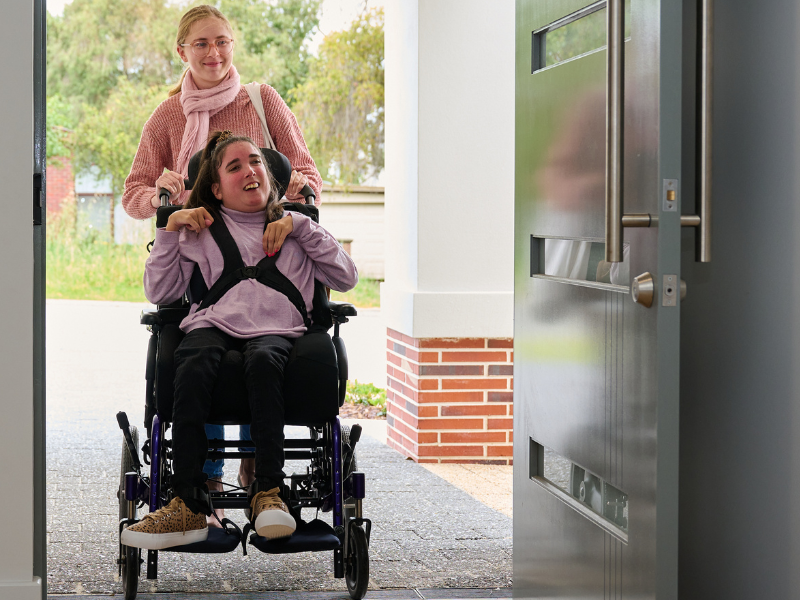SDA vs SIL. What’s the difference?
The National Disability Insurance Scheme, also known as NDIS is a government organisation that offers financial assistance for a range of support services, including independent living support and accommodation needs.

Understanding Specialist Disability Accommodation (SDA)
SDA, or Specialist Disability Accommodation, is safe, secure, and purpose-built housing that meets the unique needs of individuals with significant disability. This type of accommodation can include features such as wheelchair accessibility, home automation and communication technology.
The main objective of SDA housing is to provide residents with a safe, comfortable, and supportive living environment tailored to their unique requirements – promoting independence, inclusion, and quality of life.
SDA is funded by the NDIS and is typically provided to individuals with an extreme functional impairment, or very high support needs.
Your SDA funding will cover the cost of the home you live in (ie: the bricks and mortar), however you’ll still need to pay a reasonable rent contribution. This is based on a portion of your disability support pension.
Your SDA provider will use your rental payment to manage and maintain the property, ensuring that it remains accessible, functional for independent living, and suitable for your specific lifestyle needs.
Exploring Supported Independent Living (SIL)
SIL is an NDIS-funded disability support service for individuals who require assistance with daily tasks in order to live more independently.
This support can include help with household chores, personal care, meal preparation and managing finances, among other tasks, depending on the individual’s needs.
SIL funds cover the cost of the support workers who work in your home to provide these services.
What are the Differences Between SIL and SDA?
The key difference between SIL and SDA is that SIL provides support services to assist individuals with daily living tasks, while SDA provides specialised accommodation.
Purpose:
- SIL: Provides support services to individuals with disabilities to help them live independently in their own homes or shared accommodation. This includes assistance with daily tasks such as personal care, household chores, meal preparation, and managing medication.
- SDA: Involves the provision of purpose-built housing designed specifically for people with significant disabilities. The design includes specialised features and modifications, such as wheelchair accessibility, home automation and communication technology.
Funding:
- SIL: Typically funded through the NDIS to cover the costs of support workers or carers.
- SDA: Funded through the NDIS to cover the costs associated with the construction, maintenance, and operation of purpose-built SDA housing.
Focus:
- SIL: Focuses on enabling individuals with disabilities to develop skills and access support to help them live independently.
- SDA: Focuses on providing suitable and accessible housing options for people with significant disabilities to promote independence and quality of life.
A key point to note regarding the difference between SDA and SIL, is that separating your home from your support means that if you are unhappy with your SIL provider, you don’t have to move out and can opt to explore different support providers.
And vice versa – if you don’t love the home you’re in, you can move house and keep the same SIL supports in place.
SDA and SIL services should be regarded separately, to ensure choice and control over where NDIS participants live and what support they receive. You should never be in a situation where you feel ‘stuck’ with either the home or the support provider.
Navigating SIL & SDA with Sana Living
Sana Living is a Specialist Disability Accommodation (SDA) provider and we do not offer Supported Independent Living (SIL) services.
Our philosophy is that residents should have choice; you should be able to choose where you live and who provides the disability services you need – rather than having to use the same provider for both.
SDA Support Services
If you’re looking for a SDA provider, the team at Sana Living can help you find luxury disability housing in WA, SA and QLD. Get in contact with our friendly team for information on our beautiful homes.
FAQs
What is the difference between SDA and SIL?
SDA (Specialist Disability Accommodation) addresses accommodation needs, while SIL (Supported Independent Living) provides assistance with daily living tasks.
How does NDIS funding work for SDA?
Under the NDIS (National Disability Insurance Scheme), funding for SDA works through participant plans. Participants who are eligible for SDA funding will have their needs assessed, and if it’s determined that they require specialist accommodation, the NDIS will allocate specific funding in their plan.
This funding can then be used to cover the costs associated with accessing suitable NDIS accommodation options that meet the participant’s needs.
Can you have SDA without SIL?
Yes, you can and should always be able to access these services separately to allow you to make empowered choices for your specific needs.
While some individuals may require both SDA and SIL, others may only require one or the other depending on their level of independence and support needs.
Separating SDA and SIL allows for greater flexibility in the allocation of resources and funding, enabling providers to better meet the diverse needs of people with disabilities.





